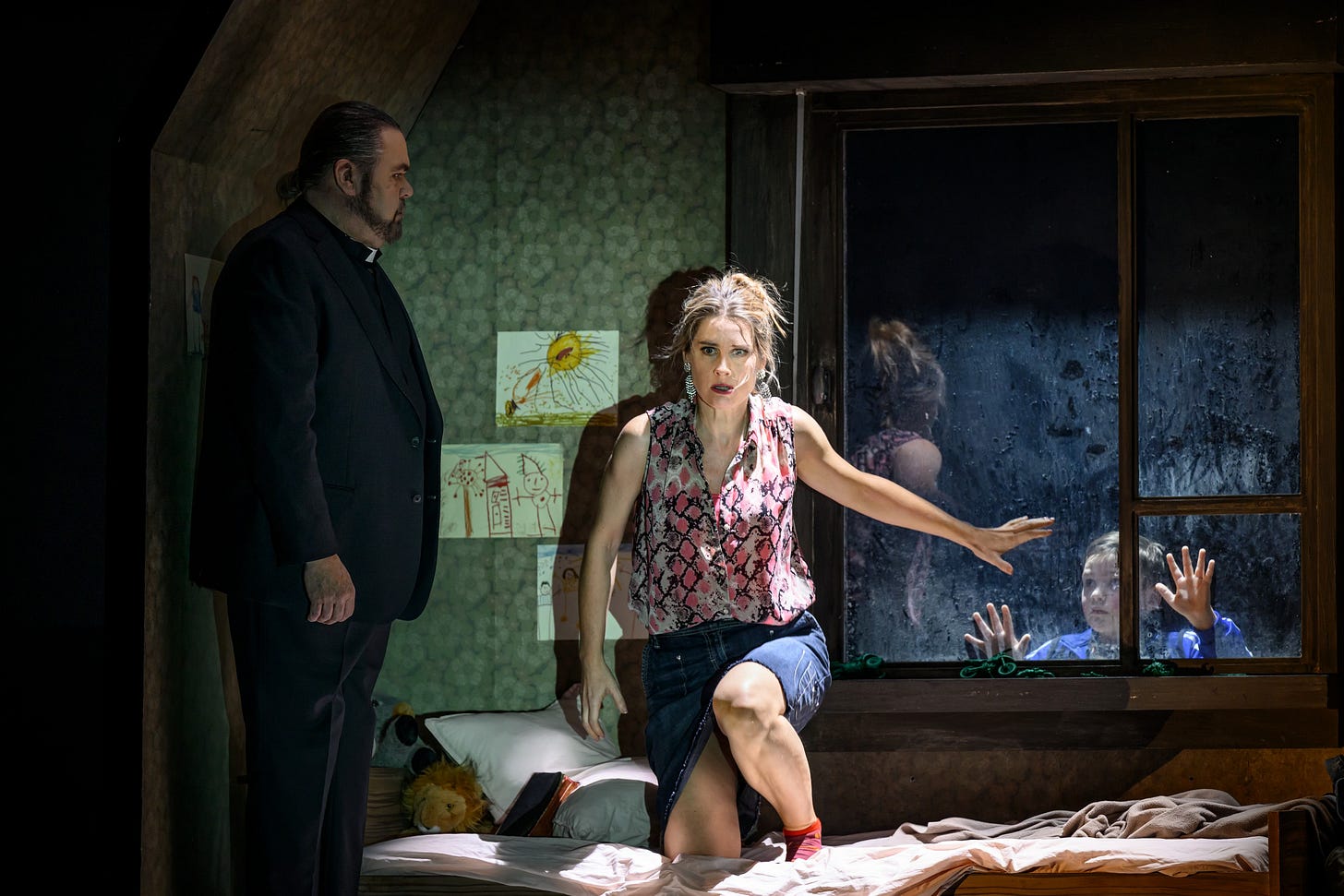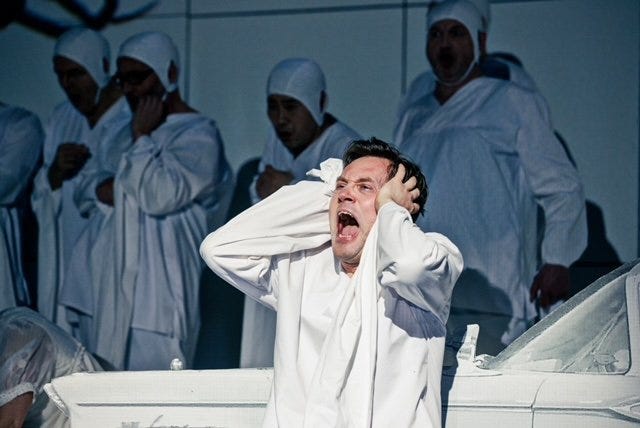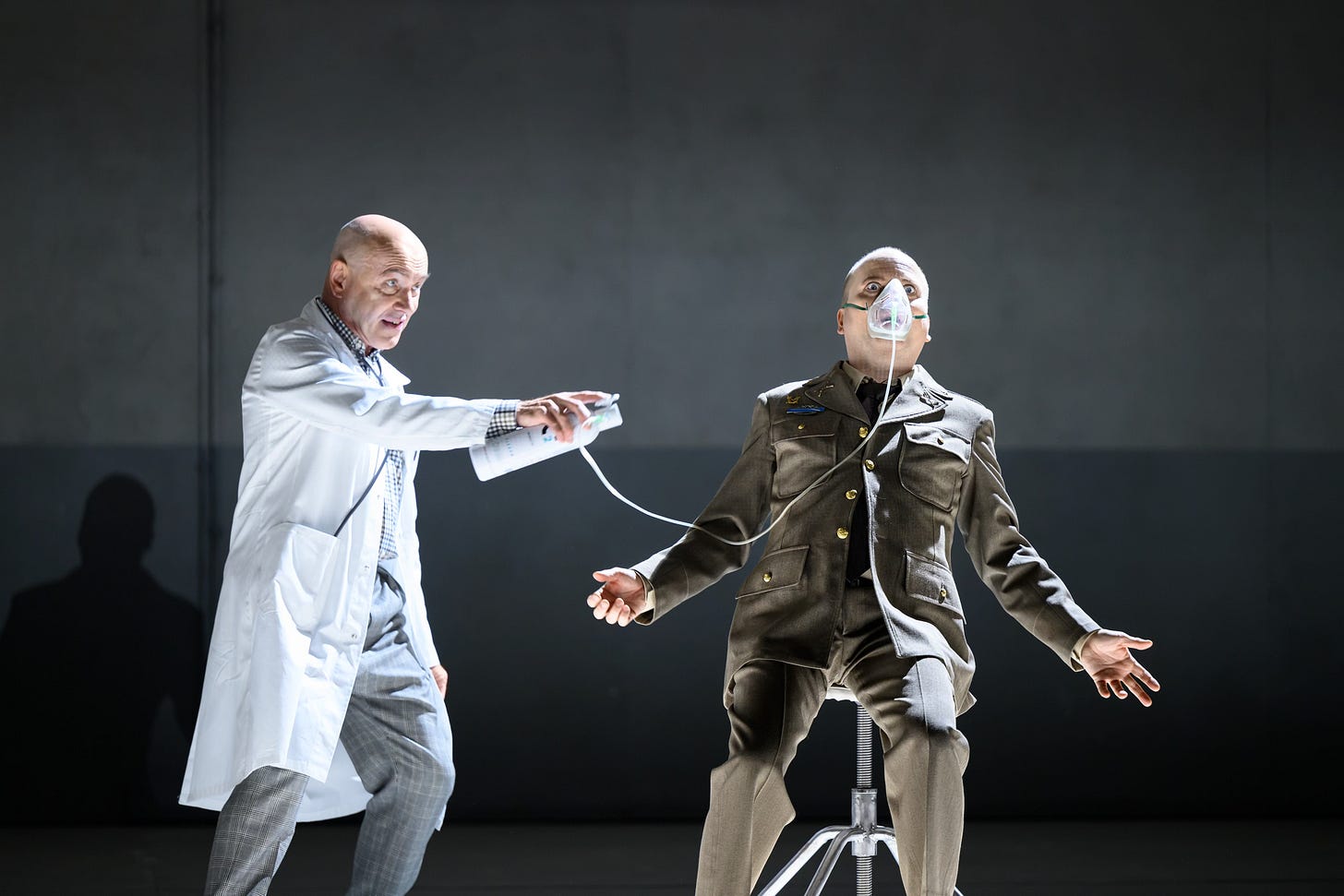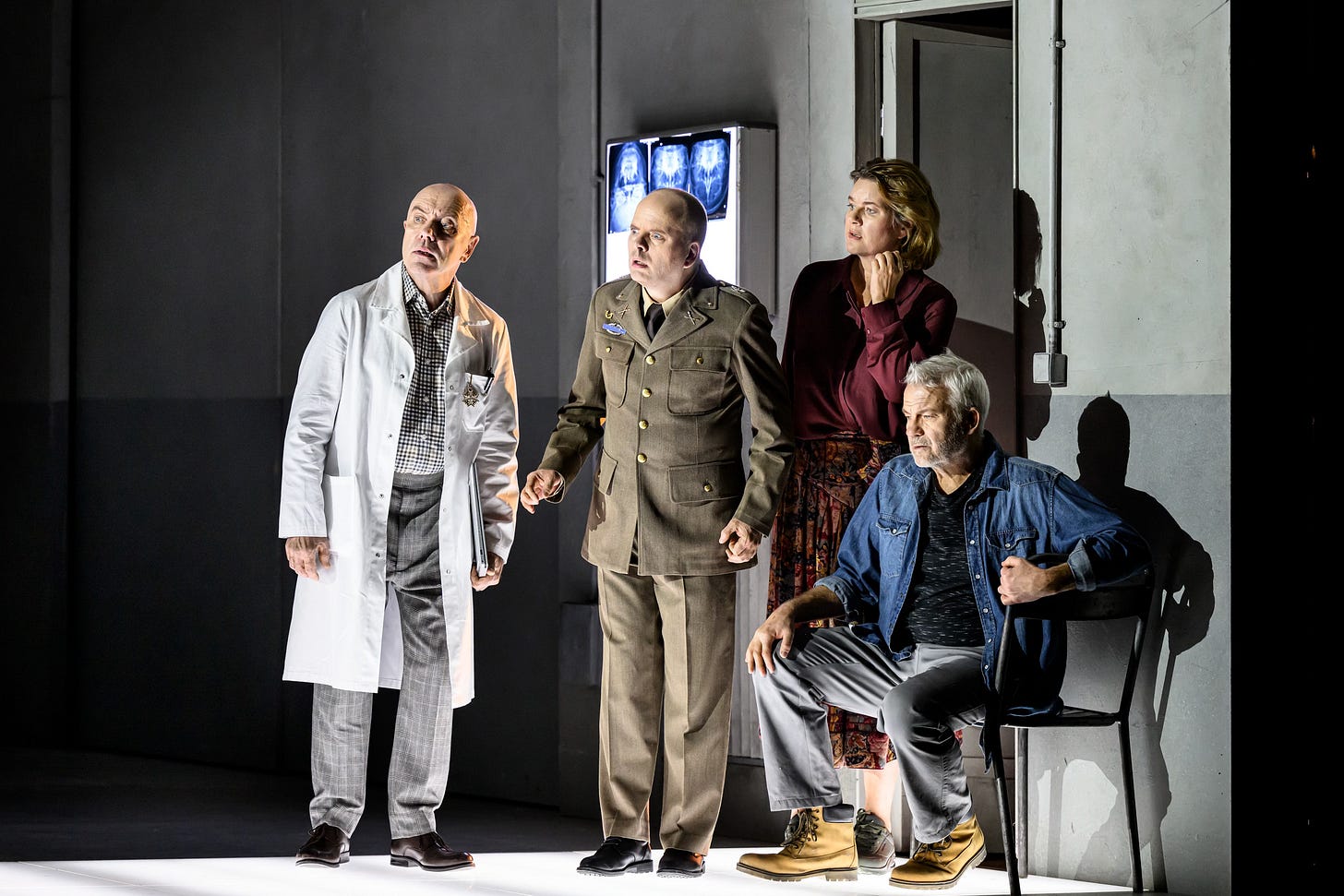Classy Marie: Malin Byström in Richard Brunel’s Royal Swedish Opera staging with Lennart Fordén (left) as the Priest/First Apprentice and Melker Roswald (right) as her child Picture © Royal Swedish Opera/Sören Vilks
In Leipzig’s marketplace on 24 August 1824, Johann Christian Woyzeck was beheaded for the murder of his mistress - the mother of his child. This was one of Germany’s last public executions and a cause célèbreamong German jurists, because the condemned man was considered by some to be of unsound mind. The German playwright Georg Büchner, only 11 when Woyzeck died, left his shambolic eponymous spoken drama unfinished at his own deathin 1837: a fragmentary series of sketches which lay unperformed until 1913. At the premiere at Munich’s Residenz Theatre it was billed as Wozzeck due to a misreading of Büchner’s often indecipherable manuscript. Not until after the first performance of Berg’s first opera - at the Berlin Staatsoper in November 1925 - was the correct spelling of the name of Büchner’s tragic anti-hero established.
Berg used the disorganised scenes of Büchner’s manuscript to create an operatic masterpiece, hugely influential in both subject matter and structure, and yet at the same time a one-off. It is now a central work of the modern repertoire.
The UK premiere in 1934 was conducted by Adrian Boult during his tenure as chief conductor of the BBC Symphony Orchestra: a later broadcast performance (1949) has been recently issued on CD by SOMM records. It includes a glowing interpretation of Wozzeck’s mistress Marie by the versatile Belgian soprano Suzanne Danco.
Wozzeck entered the Royal Opera’s repertoire in 1952, featuring two of the artists involved in the 1925 Berlin premiere - the conductor Erich Kleiber and the designer Caspar Neher, whose sets were still in use by the time I saw my first Wozzeck there in 1984, conducted by Christoph von Dohnanyi with his then wife, Anja Silja, as Marie. Berg’s opera has since been staged by most UK opera companies and the Royal Opera has presented two further productions, the most recent by Deborah Warner in 2023. But Wozzeck rarely if ever sells out: it usually appears on opera companies’ playbills principally because conductors, directors and important singers want to perform it.
Birger Radde as Wozzeck in the Badische Staatstheater production Picture © Badische Staatstheater, Karlsruhe
It was something of a surprise to me, therefore, that the new production I attended at Opéra de Lyon in September proved something of a box-office hit. That may have been due to the Lyon audience’s faith in the artists involved - the music director Daniele Rustioni, the general director Richard Brunel and the leading French baritone de nos jours, Stéphane Degout. I found it such a compelling evening in the theatre - performed, as many houses do these days, without an interval - that I decided to see it again at the Royal Swedish Opera in Stockholm in December, with a hardly less remarkable line-up. Peter Mattei was to have sung the title role, but in the event he was indisposed and replaced by the German baritone Birger Radde. Malin Byström, Sweden’s leading soprano, sang Marie, and the conductor was Alan Gilbert, an American steeped in Berg’s idiom.
Wozzeck’s tormentors: John Erik Eleby (Doctor) Niklas Bjoerling Regent (Captain) Picture © Royal Swedish Opera/Sören Vilks
Brunel’s staging had changed little since its October airing in Lyon: the only striking difference I noted was that, unlike in Lyon, the Captain in Stockholm (Niklas Bjoerling Rygert) was presented not in a gleaming white uniform but in standard issue khakis. Both performances - in Etienne Pluss’s clinically grey sets, suggesting a modern torture chamber with its glaring central light - delivered the narrative in all its stark horror. I was not convinced that the renaming of the Apprentices as Priest and Minister would alter the dramatic perspective significantly, but at least Thibault Vancraenenbronck’s clerical costuming clearly underlined the irony of Büchner’s use of Biblical quotations to expose the Captain and Doctor’s hypocrisy.
Pluss’s grey stage was enhanced by transportable smaller rooms on wheels, creating the ambience for Marie’s house and the soldiers’ barracks. His designs rarely gave an impression of the outdoors: this was most noticeable in the moonlit scene by the lake where Wozzeck stabs and drowns Marie. But the sense of claustrophobia was undeniably chilling, not least in the final scene in which their (older-than-usual) child nonchalantly prepared his meal and ate it at the table where the corpses of his dead parents were sitting, while one of his child playmates cried “Your mother is dead” from outside.
Eleby (Doctor), Rygert (Captain), Katarina Leoson (Margret), Jonas Degerfeldt (Andres) Picture © RSO/Sören Vilks
In both Lyon and Stockholm, the lead singers triumphed in their roles. Degout’s hollow-eyed, frazzled Wozzeck in Lyon may have seemed more deranged than Radde’s hardly less frighteningly ‘normal’ portrayal in Stockholm, and it could be argued that Byström is too classy a singer for Marie, compared to Ambur Braid’s tartier portrayal in Lyon, but both singers sang their notes with remarkable lyricism and beauty. The co-principals throughout were all expert ‘ensemble’ performers, with Thomas Ebenstein (Lyon) a notably psychotic Captain, fearless in his assaults on the stratosphere - including falsetto grotesquerie.
Each performance underlined Wozzeck’s status as one of the most influential operas of the century, and mirabile dictu, both were as good as sold out. Given that this opera’s cruel subject matter is hardly a glowing endorsement of benign humanity, that is quite an achievement. Berg’s score and Büchner’s words transcend its frank exposé of abject poverty and mocking persecution. More than ever, we need to be reminded of these horrors today.
Cast and Creatives
Royal Swedish Opera/Opéra de Lyon
Wozzeck Birger Radder/Stéphane Degout Marie Malin Byström/Ambur Braid Captain Niklas Bjoerling Rygert/Thomas Ebenstein Doctor John Erik Eleby/Thomas Faulkner Drum-Major Klas Hablund/Robert Watson Andres Jonas Degefeldt/Robert Lewis Fool Andrius Barks/Filipp Varik Margret Katarina Leoson/Jenny Anne Flory Apprentices Lennart Forsén/Hugo Santos; Andreas Lundmark/Alexander de Jong Marie’s Child Melker Rosewald/Jeanne Bouchonnet
Conductor Alan Gilbert/Daniele Rustioni Director Richard Brunel Sets Etienne Pluss Costumes Thibault Vancraenenbronck Lighting Laurent Castaingt Dramaturgy Catherine Allied-Nicolas
Performances attended: October 4, 2024 (Lyon), 25 November 2024 (Stockholm)
Wozzeck in 2025
Canadian Opera Company, Four Seasons Centre, Toronto
William Kentridge staging conducted by Johannes Debus, with Michael Kupfer-Radecky (Wozzeck), Ambur Braid (Marie), Michael Schade (Captain)
Apr 25, 27, May 3, 8, 10, 14, 16
Opera van Vlaanderen
Johan Simons staging conducted by Alejo Pérez, with Robin Adams (Wozzeck), Anna Magdalena Hoffmann (Marie), James Kryshak (Captain)
Jun 1, 3, 7, 10, 12 (Antwerp) 21, 24, 27, 29 (Ghent)
Websites: coc.ca; operaballet.be








I confess I have never seen Wozzek but I can claim to have heard Suzanne Danco in Geneva as a young teenager: it was my first opera and I went largely because my best friend was dancing in it - but I remember the jewels aria as if it were yesterday!
I’m green with envy! I never saw her live but she is one of my favourite singers on disc: she is Cherubino & Donna Anna (!) on the first Figaro & Don Giovanni I bought on LP and I adore her account of Ravel’s Shéhérazade with Ansermet & the Orchestra de La Suisse Romande 🥰